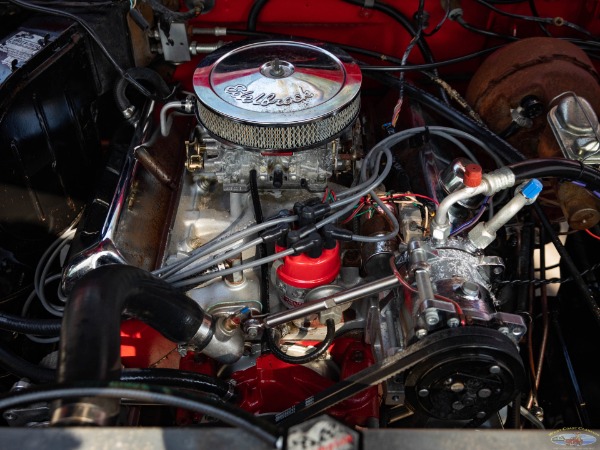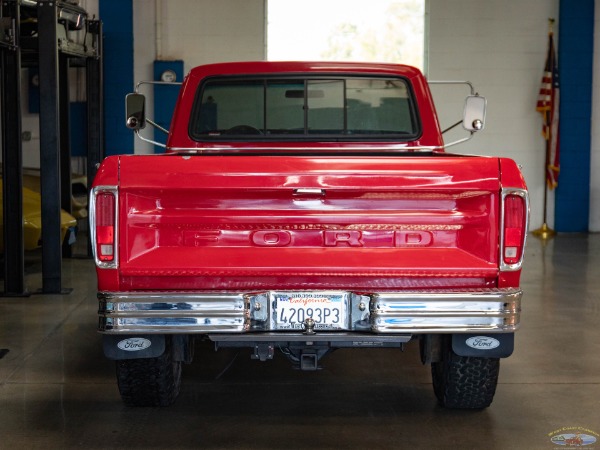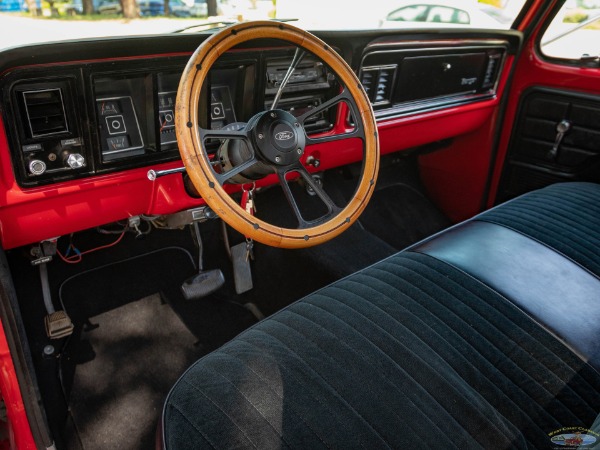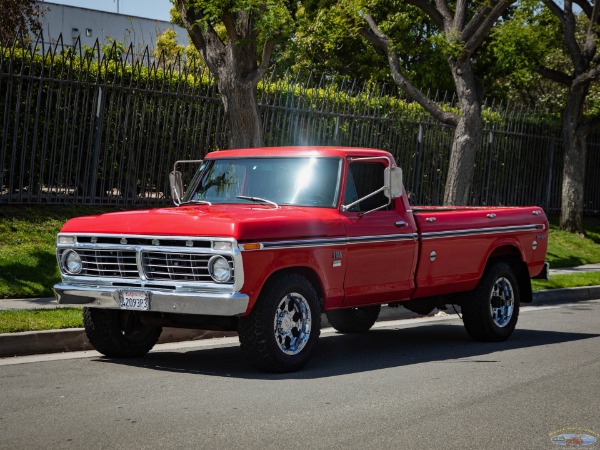Foundations of Strength: The Genesis of the 1974 Ford F350
Initially, Ford launched the F350 model to address the growing demand for a robust and capable heavy-duty truck. Subsequently, the 1974 version built upon this foundation with enhanced features and greater utility, targeting both commercial and private sectors needing powerful load-bearing capacity. Furthermore, Ford designed this model to uphold a legacy of rugged durability, ensuring it could handle the rigors of intensive use. Additionally, the adaptability of the F350 allowed for various customizations, making it highly popular among industries requiring specialized vehicle solutions.
Powertrain Proficiency: Engine and Performance Details
Under its hood, the 1974 Ford F350 boasted engines that delivered both power and operational efficiency. Notably, Ford equipped the base model with a 300 cubic inch inline-six engine, celebrated for its reliability and economic fuel consumption. Additionally, for those requiring more robust performance, Ford offered a powerful 390 cubic inch V8 engine, ideal for heavy towing and high-load transport. Furthermore, Ford paired these engines with both manual and automatic transmissions, enhancing drivability and load management. Moreover, the truck featured a sturdy rear-wheel-drive system, supported by a robust suspension setup, to maintain stability and control under heavy loads.

OUR 1974 FORD F350
‘We are proud to present an exceptionally well preserved example of this southern California 1974 Ford F350 Super Camper Ranger Special Heavy Duty Full Size 1/2 ton Pick Up with the upgraded top-of-the-line 390 Big Block V8 engine matched to the 3 speed automatic transmission and 3.00 axle in a highly striking ‘Red’ color paint and fully loaded with factory options and upgrades.’
Introduction to the Ford 390 V8
- Initially, Ford introduced the 390 V8 in 1961. Subsequently, it became a popular choice for high-performance applications. Moreover, this engine was part of Ford’s FE engine series. Additionally, it showcased significant advancements over previous models.
Technical Specifications of the 390 V8
- Under the hood, the 390 V8 featured a displacement of 390 cubic inches (6.4 liters). Importantly, it was designed with a cast iron block and heads. Furthermore, the engine bore measured 4.05 inches, and the stroke was 3.78 inches. Additionally, it utilized a hydraulic lifter camshaft, enhancing its reliability.
Performance Characteristics
- Power output varied by application and tuning. Notably, in its most common form, it produced 325 horsepower. Additionally, in high-performance versions like those found in the Mustang or the Galaxie, it could produce up to 335 horsepower. Furthermore, torque figures were impressive, typically around 427 lb-ft, providing robust acceleration and hauling capabilities.
Design Functionality: Exterior and Utility Features
The exterior design of the 1974 Ford F350 focused on functional aesthetics and practical features. Similarly, the design included a pronounced grille and reinforced bumpers that provided resilience and protection in demanding work environments. Additionally, Ford offered the F350 in various bed lengths and with options for single or dual rear wheels, catering to specific hauling needs and stability requirements. Moreover, the truck’s design incorporated practical elements like integrated tie-down hooks and ample cargo space, essential for its role in construction and utility fields.
Leadership in Design and Engineering
- Gene Bordinat: As Ford’s Vice President of Design from 1961 to 1980, Gene Bordinat was responsible for overseeing the design of all Ford vehicles during the era when the 1974 Ford F350 was produced. Bordinat was a key figure in the shift towards more modern and functional vehicle designs that characterized Ford’s approach in the 1970s. Under his leadership, Ford trucks adopted a more squared-off, practical appearance that emphasized durability and performance.
- Lee Iacocca: Although more famously associated with the Mustang and his later work at Chrysler, Lee Iacocca was a significant figure in Ford’s executive team during the 1970s. As Ford’s president starting in 1970, his influence permeated all vehicle lines, focusing on market-driven features, reliability, and performance that could meet the demands of both personal and commercial users.

Design Philosophy and Team Contributions
The design of the 1974 Ford F350 was shaped by a broader team of engineers and designers who aimed to enhance the truck’s functionality and market appeal. The early 1970s saw a focus on creating vehicles that could handle more significant payloads and offer better reliability under a variety of conditions, which was critical for the F350’s target market.
Cabin Innovations: Interior Design and Comfort
Inside the cabin, Ford prioritized functional comfort and practical design in the 1974 F350. Specifically, the spacious interior was crafted with driver ergonomics in mind, featuring accessible controls and enhanced visibility. Moreover, the standard durable vinyl seating was complemented by options for more luxurious cloth upholstery and modern conveniences like air conditioning, targeting users who spent many hours on the road. Additionally, Ford offered optional audio systems and soundproofing packages to improve the in-cab environment, making long working days more bearable.

OUR OTHER INVENTORY
Enduring Impact: Significance and Legacy of the 1974 Ford F350
Finally, the 1974 Ford F350 remains a pivotal model in Ford’s truck history, exemplifying the blend of toughness and functionality that has defined Ford’s heavy-duty lineup. Not only did it pave the way for future generations of Ford trucks, but it also solidified Ford’s reputation as a leader in the truck industry. Additionally, the F350’s versatility and durability have made it a cherished model among collectors and truck enthusiasts, who appreciate its historical significance and robust performance.

